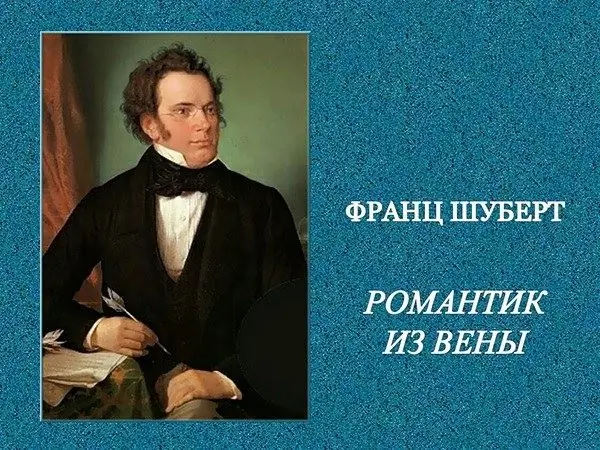- Author Antonio Harrison [email protected].
- Public 2023-12-16 07:44.
- Last modified 2025-01-22 21:44.
Franz Peter Schubert is the great Austrian composer and founder of romanticism in music. He lived a short and unhappy life, not receiving even a small part of the recognition that fell to the lot of his great predecessors: Haydn, Mozart and Beethoven. And yet he managed to say a new word in music.

Schubert lived only thirty-one years. He died, mentally and physically exhausted, tired of the failures that followed him. He wrote 9 symphonies, but none of them was played during his lifetime, only 200 songs out of 600 and only 3 sonatas out of 20 were printed.
Childhood
Schubert was born in the suburb of Vienna, Lichtenthal, on January 31, 1797. His mother was the daughter of a locksmith, and his father worked as a school teacher. From an early age, Franz was instilled with a love of music; musical evenings were constantly organized in his house.
Realizing that Franz had outstanding musical abilities, his father and brother began to teach him to play the piano and violin. Schubert also had a beautiful voice. Upon reaching the age of 11, he was sent to the school of church singers.
At school, Franz began to get involved in composing music, often to the detriment of his main studies. The father was against his ardent infatuation. He tried with all his might to distract his son from the unenviable fate of composers, whose path was difficult at that time.
The creative path of the composer
Soon the boy drops out and devotes himself to music. In 1813 he composed his first symphony in D major. After that he worked as a teacher's assistant for 3 years. At the same time, he is actively composing - in 1815 he wrote 4 operas, a string quartet, 2 symphonies and 144 songs. Soon he quits his job to re-dissolve in music.
The lack of a stable income deprived Schubert of the opportunity to marry his girlfriend - she chose to marry a better-off pastry chef.
From 1817 to 1822, Franz lived with friends, where they arranged musical meetings dedicated to his music - Schubertiada. At that time, he composed music constantly, but his timidity, unwillingness to ask and humiliate himself became the reason that most of his works remained manuscripts, and Schubert himself lived in poverty. There was a time when Franz did not even have a piano, and he composed without a musical instrument. Such failures in life influenced the style of his music, it turned from light to depressive, to match the mood of the composer.
In 1828, Schubert's friends staged the only lifetime concert of his works. The concert made a splash and significantly lifted the composer's mood. He began to create with renewed vigor, despite health problems.
His death was unexpected. Franz fell ill with typhus. His body was weakened and could not fight a serious illness. In November 1828 he passed away. His property was sold for a penny, and many of his works disappeared without a trace.






